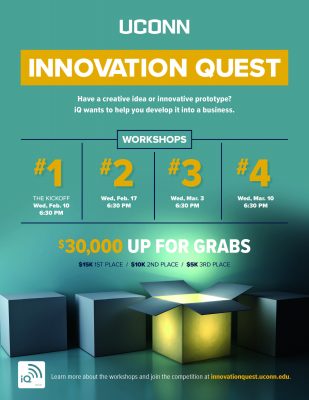Student entrepreneurs are outstanding sources of new concepts, and they are full of energy. Often times, people make severe misjudgments as to the real value of student entrepreneurship. The mythology of a student working day and night in their dorm room, then dropping out of college, is the dominant narrative. I would say that this is an almost impossible route to success, and undervalues all the contributions of others.
In this blog post, I wanted to set out a piece specifically aimed at those who advise and teach students, while giving those students a few things to watch out for as they begin their journey.
1. Students Overvalue the Idea, and Undervalue the Team
I get multiple emails a month asking for 30 minutes of my time to provide an evaluation on a student’s idea. In most cases, I have heard the idea within the last 12 months from another student or entrepreneur. Also, it has often been invested in 3 times by venture capitalists.
Now, if you are so early that you have never spoken with a potential customer, I can 100% guarantee that your idea will change dramatically before a product ever even sees the light of day. Now with that said, there is probably a kernel of greatness and a million reasons why your idea will never succeed. A million reasons why you will fail, is no reason not to try. As a student, you will learn more about business, product development, and communication by chasing a terrible idea than you will about doing nothing about it. Furthermore, that kernel of greatness in your idea has little bearing on your future success with this venture.
So if the idea is not as important as you think, what is important? Tenacity, work ethic, hunger, etc…
All of those things describe the entrepreneur, and if the first founder lacks any of them, the project will likely have a poor ending. Regardless, the founding team is the most important aspect of a student entrepreneurial attempt. Finding 2-3 complementary and committed co-founders tells me more about the likelihood of success than any other aspect of a student venture. The ability to build a core team committed to something larger than them, spells LEADER.
Rule of Thumb: Build a team of 2-3 cofounders that you are willing to marry.
2. Overly Worry About Equity Before It Is Time.
Student ventures should not divide up the equity of a team until such time as it is appropriate. When is that time? It depends. What does it depend on? Everything. There is no straight formula to building the proper equity distribution amongst founders.
What I do know is that student ventures generally skew towards a governance structure that is overly democratic. The strong social norm is to split equity and governance rights equally. I strongly disagree with this approach, except in very limited circumstances. I believe that someone needs to be the CEO or the boss, if you will.
A successful venture will require someone that is accountable and responsible for that success, and that person will be required to make difficult decisions that affect the founding team. Specifically, as the team gains traction, oftentimes the business will go beyond the ability of a particular founder. The vesting of any equity award must rely upon the successful performance of transparent duties and delivery of KPIs. The CEO, in conjunction with the Board, will have to determine if these requirements were met.
Finally, please do not make these decisions without the company lawyer at the table. If something seems really weird, consult a personal attorney. Do not forego legal counsel because it will cost you a few hundred dollars, this is the point where legal counsel is absolutely necessary.
Rule of Thumb: If you do not have a company lawyer yet, well it is too early to discuss equity.
3. Students (and Faculty) Move Too Slowly.
All emphasis is placed on product development (in a lab, developing code, etc.), and students want to have a perfect product before going into the market. Customer discovery should commence on day 1, and one of the co-founders should take the absolute lead on this aspect of the development of the startup. As Scott Case said in the first Werth Institute blog, “Customer or Die!” Why would a student or faculty startup be any different? You either have customers or you do not. If you have customers, you have a business…well, the corollary is true as well.
Day 1, find the customers. If you tell me you want to launch on campus or you interviewed a bunch of students, I know you are afraid. If your product has a target customer over the age of 21, then you need to be talking with people in that demographic about how they currently solve that problem. This is how you convince me and an investor that you have what it takes to understand the problem on a visceral level. Subject matter experts are great, but they do not replace the people that use or buy the product. Remember, just because you use a product does not mean that you buy it, and vice versa.
You as a student need to understand what a Minimally Viable Product actually is, and that depends upon knowing the customer. Move with all due speed towards that MVP launch. It will take roughly 10x longer than you think to get there, so when you move slowly that has an exponential impact. I have no doubt that this is the number one reason that student entrepreneurial ventures never see the first customer. Based upon listening to interviews of Zuckerberg, he intuitively got this. Customers’ insight come from customers using the project, and the faster you get to that, the faster you can get to a high quality product.
Rule of Thumb: If you are not sacrificing in other areas, you are not committed enough to the venture
4. Students Take Too Much Advice as Gospel
Mentorship is essential for a successful student venture. Early on, many people are eager to tell you all the ways that you are great and can be greater. The entrepreneur’s job is to determine what is good advice and what is not. That is hard when you are 20 years old and everyone looks successful to you.
Some questions to ask yourself depending upon the particular advice that is being given to you:
- Has the mentor sold into or built product for that market? Or have they done so in a similar market?
- Has the mentor raised their own funding rounds? Or have they successfully bootstrapped a company to high growth?
- How much time has passed since that mentor has been active in the startup world?
- Hardware? Software? Service? Where is the mentor coming from?
- Does the mentor serve on company’s board of directors post Series A?
- Will the mentor actually make the introductions necessary for you to raise money?
Essentially, I see a lot of mentorship happening where the mentor does not have skin in the game. Let me tell you that the level of advice, introductions, and interest skyrockets when the mentor has $25,000 or more of their own money invested in your company. If they want to be an advisor of a company that has not raised a dollar and receive equity for that role, that means they know once the deal gets real they will be blocked out.
Consider a mentor a data point. Some data points tell you more or less relevant information. You then weigh each data point based upon perceived experience, knowledge, and relevance to your situation. Any mentor that says it is their way or the highway, well you should show them the highway. They provide advice. You will need to do a lot of self-exploration, and determine where you need coaching. Then find people whom are willing to coach you. This is an efficient mechanism for finding excellent mentors.
For instance, if you are an engineer that has no idea about finance and accounting, you need to get online…find a class/tutorial etc…then ask an expert if you can call them three times for 20 minute conversations to make sure that you understand what you are learning. If you do this work thoroughly, you will have a mentor for life.
You should never ever promise advisor shares without talking to your firm’s attorney about when and where it is appropriate. A Board of Advisors is different from an “advisor.” An advisor does it out of the goodness of their heart, but a Board of Advisor member actually has significantly responsibilities to earn those shares. Generally speaking, they will agree to work for a few hours a week in a defined capacity. Sometimes they will invest their own money, but sometimes they will not. They will always introduce you to potential investors that have the actual ability to invest or they will make significant introductions in the manufacture or sale of your product. An advisor that is unwilling to open their rolodex is generally overpaid.
Rule of Thumb: Really learn a lot about your mentors’ strengths and weaknesses. This will make weighing their advice easier.










